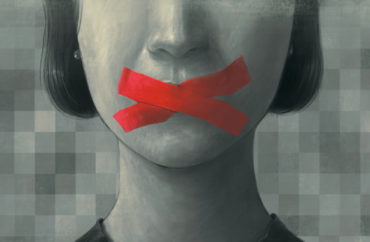
Half of conservative faculty fear voicing personal opinions, FIRE survey finds
A leading free speech organization expressed alarm at a survey that found more than one third of professors “ton[e] down” their writing to avoid “controversy.”
In the recent Foundation for Individual Rights and Expression survey, 35 percent of faculty said they self-censor their writing, and only one in five said a conservative would “fit well in their department.” The organization polled more than 6,200 faculty at 55 higher education institutions.
“I was particularly concerned to hear 1 in 3 faculty have recently toned down their writing for fear of causing controversy,” FIRE Director of Policy Reform Laura Beltz told The College Fix.
“If faculty don’t feel comfortable fully expressing themselves in their writing or research, then the whole purpose of colleges — the pursuit and generation of knowledge — is stymied,” she said in a recent email.
The survey compared the 35 percent to another poll from 1954 in which only 9 percent of social scientists answered the same question that way. This was “at the height of McCarthyism,” according to a news release.
Beltz described the results as “alarming” but not surprising.
She told The Fix they track with “what I’ve been hearing anecdotally from faculty across the country and across the political spectrum: Faculty fear reprisal over their expression in and out of the classroom, and in their research.”
The survey also found that 47 percent of conservative faculty feel that they cannot voice their opinions. This is compared to 19 percent of liberal faculty who feel this way.
The findings align with what some professors told The College Fix in a recent series of analyses about the political affiliations of university faculty. The series consistently found Democrats vastly outnumber Republicans, sometimes with zero identified in whole departments.
Some Republican faculty declined to comment or spoke anonymously for fear of retribution.
“I doubt that [my beliefs] would be respected…unless someone took the time to talk to me about them,” one UNC Chapel Hill professor told The Fix earlier this fall. “That is, I think many would pigeonhole me …”
Another at Arizona State University admitted to self-censoring “on political and social issues, especially with colleagues.”
“Although it sounds cowardly, this is due to fear of retaliation, whether overt or covert. This fear is especially salient because I do not have tenure and have seen it occur within my school,” the professor told The Fix, previously.
MORE: Gettysburg’s mandatory DEI courses ‘push political ideologies’
Meanwhile, Beltz at FIRE said there are ways universities can foster more open and accepting environments. Among other things, she told The Fix free speech should be a priority in hiring and admissions.
Additionally, “they can adopt a policy of institutional neutrality so that the institution itself no longer weighs in on political debates that are better left to students and faculty,” she said.
A number of prominent universities, including Yale, Stanford, and Johns Hopkins, have adopted institutional neutrality pledges over the past year, The Fix reported.
The changes have strong support from faculty, with 66 percent supporting institution-wide neutrality and 70 percent supporting it in individual departments, according to the recent survey.
Universities also “can reform policies on expression, academic freedom, and due process so that faculty feel more confident that their rights will be defended,” Beltz told The Fix.
She also believes institutions could work harder at training “everyone from students to faculty to staff on both free speech policies and principles.”
When asked if FIRE has noticed a shift toward more openness in light of universities ending diversity, equity, and inclusion pledges in hiring, Beltz said it’s too soon to tell.
“It is only recently that colleges have been moving away from using mandatory DEI statements in hiring, so, while we haven’t seen results in this survey that would indicate that impact yet, we anticipate that moving away from use of these statements will improve matters in the future,” Beltz said.
Notably, in the survey, faculty cited DEI and diversity-related issues “most frequently” when asked to share “a salient moment when they felt unable to express their opinion because of how others might respond,” she said.
“This finding underscores the importance of moving away from ideological litmus tests in hiring and instead empowering members of the campus community to talk across differences and engage with each other on difficult topics,” she told The Fix.
MORE: Democrat professors outnumber Republicans 7 to 1 at U. Florida
IMAGE: Superstar/Shutterstock
Like The College Fix on Facebook / Follow us on Twitter






Please join the conversation about our stories on Facebook, Twitter, Instagram, Reddit, MeWe, Rumble, Gab, Minds and Gettr.